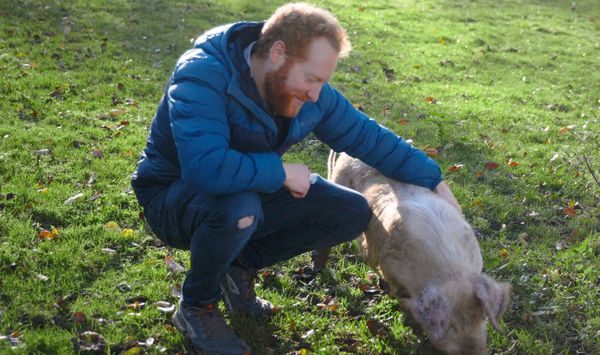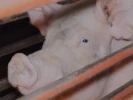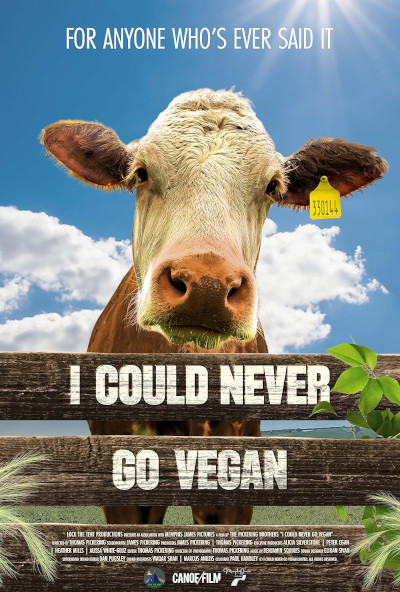Eye For Film >> Movies >> I Could Never Go Vegan (2024) Film Review
I Could Never Go Vegan
Reviewed by: Donald Munro

In I Could Never Go Vegan, Thomas Pickering purports to investigate and debunk some common arguments against veganism. Unfortunately the film does not address the arguments in a meaningful way.
Opening the film, Pickering talks about his childhood, how it was fairly normal, excepting the fact that his family were vegetarians. In a staged phone call with his mum he asks about his parents' decision not to eat meat and about other people's attitudes towards them doing that. Periodically through the film she makes more staged phone calls when all of a sudden she remembers a dismissive comment that people make about not eating meat.

The arguments against veganism can be broken down into roughly two categories. The first is straw man arguments, such as "Where do you get your protein from?", "You have to have meat," or "You can't be fit and active without meat." They are used to disguise the real objection, "I just don't want to." These are glibly, and legitimately, dismissed: plants have protein and here are some vegan athletes. Not much of the documentary is devoted to questions, however. Most of it is self congratulatory backslapping and hyperbolic claims about the health benefits of a purely plant based diet.
Every faction in a debate about food seems to have its own 'facts'. The scientific evidence to back them up is often best described as thin. The sugar lobby told everyone that fat was evil before sending a quarter of the western world towards diabetes and obesity. Some people claim seed oil is evil and we should all cook with butter and lard. Some say fructose is a catastrophe for the human body. And then there is the widespread belief that antioxidants prevent cancer by mopping up all those nasty free radicals. The human body runs on free radicals. If we got rid of them all, we'd be dead. Oxidative stress is a real phenomenon but the evidence that it is affected by non-nutrient antioxidants is currently less than convincing.
There is a second class of arguments. Some people have legitimate concerns. These are dismissed in the same glib fashion as the spurious ones. "I could never go vegan because it cost too much" is a valid argument. The cost of vegan products in a supermarket outstrips that of animal based ones. Pickering's reply is that cooking from scratch is cheaper and batch cooking even cheaper still. Cooking from scratch takes time, which many people don't have. It takes skills which they've never learned. When starting out it sucks up a lot of money. A good chef's knife £40, a quality 20 litre pot for batch cooking £150; add in chopping board, wooden spoons, mixing bowls, strainers, saucepans and other kitchen miscellanea, and you're looking at a significant outlay. In the long term it saves money, but in the short term it's painful.
Another valid concern is soya. I used to cook a lot with TVP (textured vegetable protein). It was great for chilli and bolognese and had many advantages over beef mince. It's cheap, light, doesn't need refrigerated and picks up flavour really well. Due to endocrine problems, however, I can no longer tolerate large quantities of soya in my diet. I found the jokey dismissal of that concern somewhat insulting.
At about 50 minutes in, the film pretty much abandons its original premise and looks at the two most compelling reasons for becoming vegan: animal welfare and the environment. It does the first of these with some fairly disgusting footage from UK farms and slaughterhouses, along with testimony from people who have worked in them. A good case is made for the mass farming of animals being highly detrimental to the environment. Then ideology trumps fact. The claim is made that all animal farming is causing climate change. A herd grazing on marginal land, the old fashioned way, is going to be carbon negative. The sun shines, the rain falls and the grass grows, taking up CO2 from the atmosphere, and the herd eats the grass. The dung that the herd drops, rich in carbon, is carried into the soil, improving its quality. When you come across a lie in a documentary it makes you question the voracity of the rest of the claims in the film.
As the film ends we get to catch up with the athletes from the start and find out how they did.
I'm not a vegetarian or a vegan but I have enjoyed eating the food. I don't have an axe to grind when it comes to most of the issues raised in the film. It didn't really address what it set out to address. If you are a vegan and want to watch an affirmation of your beliefs then I Could Never Go Vegan will work for you. If you're just kind of thinking about these things, it will probably lose you at about the half way mark.
Reviewed on: 01 Dec 2024















